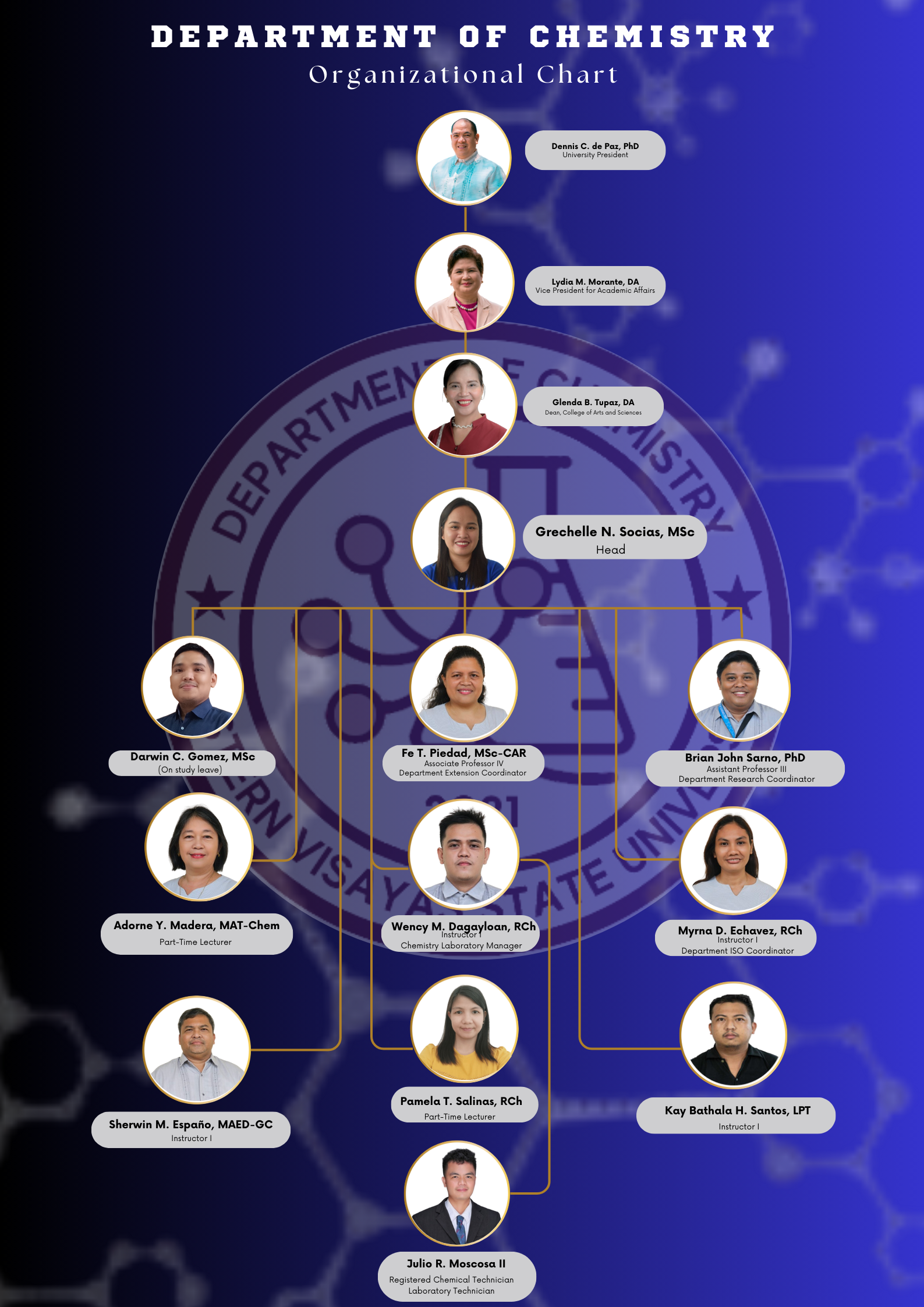Nature of the Field Study
Chemistry is the branch of the natural sciences that studies matter, its composition, properties and reactions. It includes the “study, analysis, modification and calculations and physico-chemical or biochemical properties and supramolecular composition and structure of matter, properties and reactions, the changes which matter undergoes, the energy involved, and the conditions under which such changes occur: (R.A. 10657 Chemistry Profession Act of 2015). It is a broad field, which overlaps with other fields, particularly biology, physics and geology. Chemistry also has a role in interconnecting other fields and has thus been described as the Central Science.
The core disciplines of Chemistry are inorganic, organic, analytical, physical chemistry and biochemistry.
Chemistry is beneficial to society. It is the foundation science for many industrial and agricultural processes that produce useful products that contribute to the improvement of the quality of life. It impacts on the human health – producing materials, developing methods and advancing knowledge towards improved health care, enhanced public health and safety, safe and affordable food supply, and a sustained wholesome environment. It plays a key role in the development of materials and processes for the production of sustainable renewable energy. It is indeed a science of numerous opportunities.
Chemistry engages international concern and action. It espouses collaborative efforts that span borders and cultures towards the enhancement of chemical knowledge and processes for the benefit of society and environment. It promotes a common global standard of excellence and relevance in scientific endeavors and output.
Chemistry is essential for the continued development of the Philippines. Therefore, any policy designed to upgrade chemistry education at the college level should take into account the diversity of chemistry, the need for trained personnel and the significant investment needed to sustain an acceptable standard of chemistry education.
Program Goals
To prepare students to be professionally competent productive chemists and chemical technicians who value excellence, service, and diversity by providing dynamic and adaptive curriculum.
Specific Professions/ careers/ occupations or trades that BS Chem graduates may go into
With a BS Chem degree and professional license, a graduate can be employed as laboratory chemist in industries and companies that deal with chemicals, food and beverage, cosmetics, pharmaceuticals, oils and petroleum, mineral and metals, textile, agricultural products, pulp and paper, analytical chemistry services, quality control, research among others. Graduates can also be employed in government agencies with similar lines of concern and in crime laboratories for forensic analysis.
The BS Chem degree holder can also secure non-laboratory work such as science communication, technical writing, entrepreneurship, marketing and management, product sales, chemical information service, health and safety, intellectual property, project management, etc.
A graduate of Chemistry program can be employed in colleges and universities. Further training (MS and PhD) would qualify graduates for tenured positions in the academe.
Program Educational Objectives
- Produce graduates who comply with the current qualification requirements of professional chemists and are competent productive human resource.
- Prepare students for higher studies in chemistry and in other fields
Program Outcomes
- Demonstrate a broad knowledge and understanding in the core areas of chemistry; inorganic, physical, biological and analytical chemistry; and in addition, the necessary background in mathematics and physics.
- Gather data using standard laboratory equipment, modern instrumentation and classical techniques.
- Identify and solve problems involving chemistry, using current disciplinary principles.
- Qualify for further study and/or for entry-level professional employment in the general workplace.
- Work effectively and independently in multi-disciplinary and multicultural teams.
- Act in recognition of professional, social, and ethical responsibility.
- Effectively communicate orally and in writing using both English and Filipino.
- Articulate and discuss the latest developments in the specific field of practice.
- Interpret relevant scientific data and make judgments that include reflection on relevant scientific and ethical issues.
- Preserve and promote “Filipino historical and cultural heritage”.
Allied Fields:
- Marine Science
- Geological Sciences
- Physics
- Molecular Biology and Biotechnology
- Materials Science
- Pharmaceutical Science
- Food Science
- Agricultural Sciences
- Chemical Engineering
- Forensic Sciences
- Environmental Science
Office Services:
- The Department offers technical consultation and analytical services
- The Department also offers extension services like livelihood training focusing on Dishwashing Liquid training, soap making, candle making, wine production training.
- The Department also offers chemical education such as a review program for chemical technician licensure exam and training/workshop on certain chemistry-related topics.






